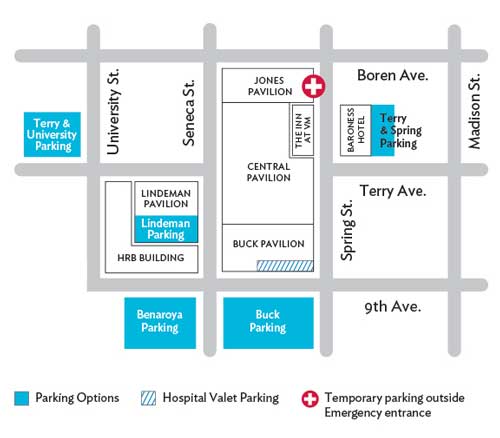Important Information: Visits and COVID-19
Entering Our Facilities
To ensure our facilities are safe places, please note the following:
- We ask that you arrive with a face covering; if you do not have a face covering, one will be provided to you upon entrance
- Face coverings must be worn at all times while in our facilities
- Please note that valved facemasks must be replaced or covered
When you are having a medical emergency, wait times matter. The Emergency Department at Virginia Mason has lower wait times than both the national average and Washington state average.*
On average, people who come to our emergency department spend less time:
- Waiting to see a doctor
- Being admitted to the hospital, if necessary
- Waiting for a hospital room, if admitted
* Information as reported by Medicare.gov/HospitalCompare.
If you arrive by ambulance with a possible stroke emergency, cardiac emergency or other medical emergency, you will be quickly but thoroughly evaluated, and appropriate treatment will be started immediately.
Being prepared for a medical emergency
Is THIS a medical emergency?
Why Virginia Mason?
Being prepared for a medical emergency
The best time to plan for an emergency is before it happens. Research these items in advance:
- Location of nearest emergency departments
- Average wait times
- Hospital specialties
- If they have rapid-fire, dedicated teams to handle emergencies such as stroke, pulmonary embolisms, cardiac events and sepsis
Keep an emergency information packet handy in your home and car that includes:
- Current medications
- Ongoing medical conditions, such as “insulin-dependent diabetic”
- Any devices you have, such as: “Have a pacemaker”
- Any allergies
- Contact information for your primary care and specialty care physicians
- A copy of your photo ID and insurance card
- List of emergency contacts
IsTHIS a medical emergency?
Some medical emergencies seem obvious because of their dramatic symptoms. If you or someone near you has a life-threatening injuring or other medical emergency, dial 911 immediately.
Other times, it is harder to decide if a trip to the Emergency Department is necessary.
In addition to life-threatening emergencies involving strokes, heart attacks, and injuries, the Emergency Department at Virginia Mason also treats a wide range of symptoms, including:
- Blurred vision
- Breathing problems
- Broken bones
- Burns
- Cuts
- Concussions
- Severe Fever
- Numbness in arm, face or leg
- Seizures
- Vomiting blood
- Other acute symptoms
Stitches or a Band-Aid? If you have a question, for example, about whether a seemingly minor cut requires stitches, Virginia Mason’s Virtual Care Clinic can help. Typically, within 30 minutes of answering some basic questions online, you can have a virtual visit with a medical professional who can advise you.
Why Virginia Mason?
The Emergency Department at Virginia Mason is staffed by highly experienced, board-certified emergency physicians and certified emergency nurses. Each is certified in Advanced Cardiovascular Life Support and Pediatric Advanced Life Support.
We have teams who are ready to treat all types of emergencies including pulmonary issues, stroke, heart attacks and sepsis.
The Emergency Department is seamlessly connected to the rest of the Virginia Mason Health System. If you need to be admitted to the hospital, your medical records will be immediately available to any of our health care providers who will be taking care of you.
If you are driving yourself or a loved one to an Emergency Department, remember that our wait times are shorter than average. Or if an EMT or paramedic asks what hospital you prefer to be taken to, we suggest Virginia Mason.

